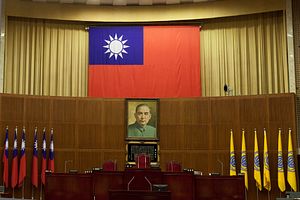Since Tsai Ing-wen became president of the Republic of China (ROC), commonly referred to as Taiwan, cross-strait relations have been deteriorating day by day.
While the People’s Republic of China (PRC), commonly referred to as just China or mainland China, keeps criticizing Tsai for damaging relations by refusing to acknowledge the 1992 Consensus, Tsai always counter-argues that her administration is maintaining the “status quo” and “has consistently expressed goodwill.”
Yet the latest incident undoubtedly gives mainland China a new piece of evidence to argue Tsai’s administration is not doing what it says. On July 12, Taiwan’s Ministry of Foreign Affairs (MOFA) deleted the webpage on Taiwan’s international status, which claims Taiwan is part of the ROC.
The article on Taiwan’s international status, which has been removed from MOFA’s official website (although the content could still be found in MOFA’s mobile version), straightforwardly says in its first line: “Taiwan is the territory of the Republic of China — this is a position absolutely consistent with history and international law.”
The article proceeds to quote several legally binding World War II-era documents — the Cairo Declaration, the Potsdam Proclamation, and the Japanese Instrument of Surrender — to demonstrate its point. In particular, the article largely quotes the Cairo Declaration, which was announced jointly by the ROC, the United States, and the United Kingdom on December 1, 1943, as the Cairo Declaration stipulates: “…all the territories Japan has stolen from the Chinese, such as Manchuria, Formosa [an alternative name for Taiwan], and the Pescadores, shall be restored to the Republic of China. ”
Ironically, MOFA spokesperson Wang Peiling just confirmed to Radio Free Asia (RFA) that MOFA would not remove the webpage on July 11. She explained MOFA’s position on the Cairo Declaration:
[The Cairo Declaration’s] connotation has been repeatedly cited in post-war documents, and got the attention of the majority of governments and academia. As for our academic circles, any study regarding Taiwan’s international status is protected by freedom of speech. The Ministry of Foreign Affairs has always respected different opinions.
Now that the webpage has been removed, the official language about “Taiwan is the territory of the Republic of China,” which was upheld by Tsai’s predecessor, Ma Ying-jeou, for eight years, is gone from MOFA’s website as well.
Not only has MOFA removed the article, but Taiwan’s new high-school textbooks will also delete content related to Taiwan’s international status based on the Cairo Declaration and other wartime documents.
Taiwan’s former President Ma Ying-jeou has objected to the decision. He argued on July 11 that MOFA should not remove the webpage and he warned Tsai’s government that “removal the part about the Cairo Declaration would make Taiwan’s international space more and more narrow.”
Unsurprising, mainland China immediately condemned the Tsai government for the incident. Ma Xiaoguang, the spokesman for China’s Taiwan Affairs Office, said on July 12:
There is only one China in the world, and Taiwan is an inseparable part of China. It has undeniable historical facts and legal basis and is universally recognized by the international community. Any attempt to change Taiwan’s position as part of China is futile.
It is worth noted here that Ma Xiaoguang didn’t clarify which China — ROC or PRC — he was referring to. According to the 1992 Consensus, as long as both governments acknowledge Taiwan is part of China, whether “China” means the ROC or PRC, the “status quo” could be maintained.
Hopefully, Tsai’s administration didn’t really mean to abandon the fundamental concept of Taiwan being part of the ROC, and the removal of the webpage on the MOFA site is only temporary.
Charlotte Gao holds a MA degree in Asian Studies. Her research interests center around East Asian topics. She has worked in the past as a news editor, reporter, and writer for multiple traditional, online, and new media outlets.
































